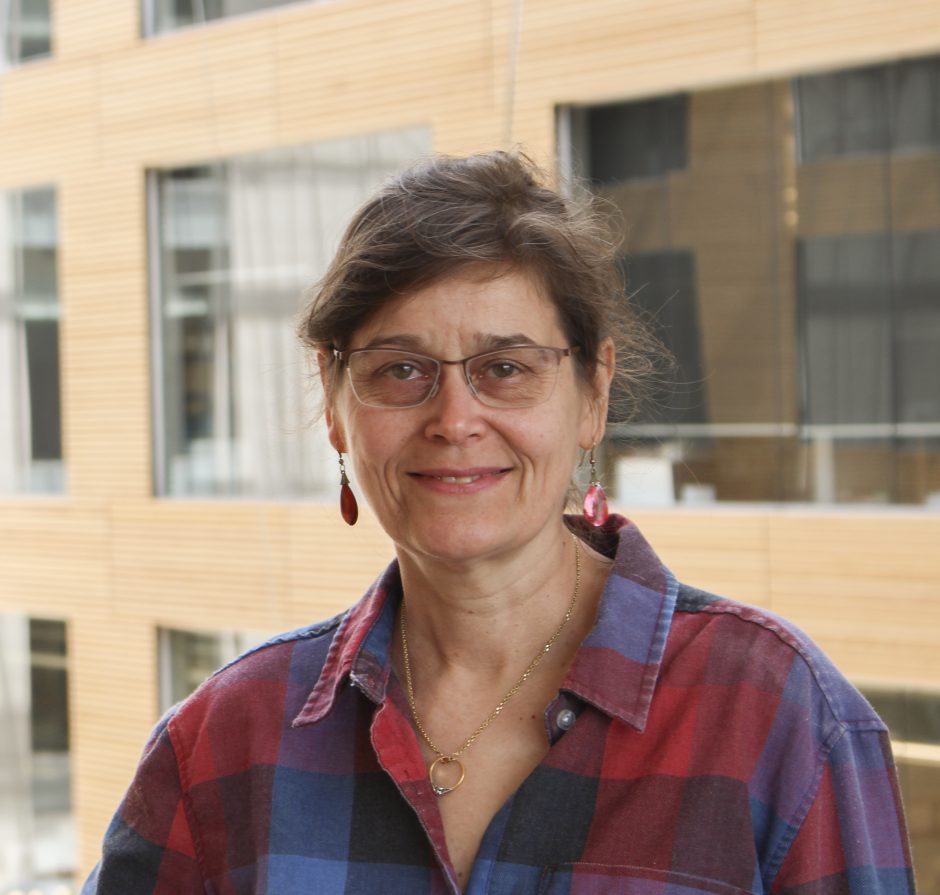
Research Interests
Cancer, Cell Adhesion Molecules, Immune response regulation, Inflammation, Innate immunity
Research Focus Teams
Cancer, COVID-19, Lung Disease
Departments
Contact
Email: pauline.johnson@ubc.ca
Office Phone: phone: 604–822–8980
Publications
Lab Website
Pauline Johnson is a immunologist and microbiologist at UBC. Her research focuses on innate and adaptive immune mechanisms — in particular, the mobility of proteins in membranes, lymphocyte cell surface molecules, T cell signalling, leukocyte adhesion, and macrophages in lung inflammation.
Dr. Johnson was born in Yorkshire, England. She earned a BSc in biochemistry from Liverpool University in 1980, and a Ph.D from the University of Dundee in 1983. Her Ph.D. project was to determine the lateral and rotational mobility of membrane components measured by fluorescence recovery after photobleaching and fluorescence depletion recovery.
She was a post-doctoral fellow at the Salk Institute in California, US under the supervision of Ian Trowbridge and at the MRC Cellular Immunology Unit at the University of Oxford, U.K. under the supervision of Alan F. Williams before joining the faculty at the University of British Columbia in 1991.
Johnson helped to establish the function of CD45 as a critical protein tyrosine phosphatase in T cell activation and defined the mechanisms regulating the interactions of the cell adhesion molecule CD44 with the matrix component, hyaluronan.
She held an MRC Scientist Award and was Co-Director of the Infection, Inflammation and Immunity Research Group at the Life Science Institute at UBC (2003-2009). She has served multiple times on the CIHR Immunology and Transplantation panel, including as Scientific Officer, as well as on other national and international review panels. She is a member of the CIHR III Institute Advisory Board (III institute = Inflammation, infection and immunity CIHR Institute).
- MRC Scientist Award, MRC of Canada, 1999-2004
- Women in Science Award for Community Leadership and Scientific Excellence, Minerva Foundation for B.C. Women, 2013
The current focus of my lab is to understand how macrophages contribute to inflammation, fibrosis, and cancer metastasis, in the lung. Specifically, we are investigating the role of monocyte-derived macrophages and alveolar macrophages in these processes. We are also interested in how macrophages interact with hyaluronan, a key component of extracellular and peri-cellular matrices, which is upregulated upon tissue infection or injury and is instrumental in tissue repair.
The immune system
Our immune system does an incredible job to protect us from both infectious diseases and cancer, and also plays a key role in tissue repair. It is made up of the innate and adaptive immune systems, which together provide effective and powerful tools to keep us healthy. Macrophages are innate immune cells that act as sentinels, particularly in mucosal tissues. They not only protect against infection and aid in tissue repair, they also help to maintain tissue homeostasis. In the lung, alveolar macrophages maintain lung function and protect against damage and infection. Like stem cells, they self-renew for the lifetime of the host in healthy tissues, but after infection and death, some replenishment may occur from bone marrow derived monocytes. We are interested in understanding the function of tissue resident and monocyte-derived lung macrophages in healthy, diseased and fibrotic lungs.
Inflammatory diseases
Many diseases have an inflammatory component. Inflammation is an immediate response to infection or tissue injury. It is normally a beneficial response that recruits immune cells to the site of injury to fight infection. Macrophages are critical immune cells that contribute to all phases of the inflammatory response: monocytes drive inflammation, macrophages drive tissue repair and promote the resolution of the inflammatory response. The persistence of inflammation leads to chronic inflammatory diseases such as chronic obstructive pulmonary disease (COPD), arthritis, atherosclerosis, and inflammatory bowel diseases. Chronic inflammatory diseases are a major health problem — they are progressive, have no cure, and cost our health system billions in long term care.
In order to find effective treatments, we perform fundamental discovery research to understand how lung macrophages promote inflammation, regulate repair and resolve inflammation in a normal inflammatory response, and how this goes awry in chronic lung inflammation and fibrosis. In addition, we are interested in the contributions of the extracellular matrix component, hyaluronan, which is increased in inflammation and remodeled during infection and repair.
Cancer metastasis and the contributions of hyaluronan and macrophages
Inflammation results in increased levels of hyaluronan and the recruitment of monocyte-derived macrophages that promote tissue repair by remodeling the extracellular matrix and stimulating cell proliferation. In collaboration with the Roskelley lab here at UBC, we have found that this environment can also stimulate tumor growth. We are interested in understanding how hyaluronan and lung macrophages contribute to tumor growth and metastasis, so that we can identify new strategies for limiting tumor metastasis.
Visit the lab website for more detail: https://mbim.ubc.ca/people/faculty/pauline-johnson